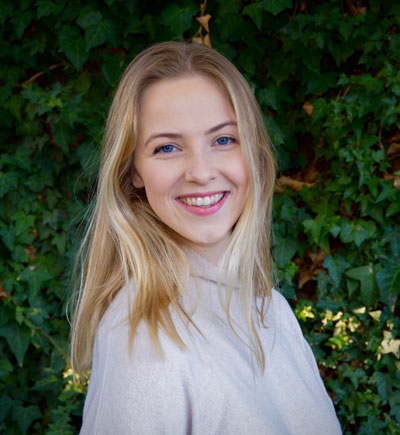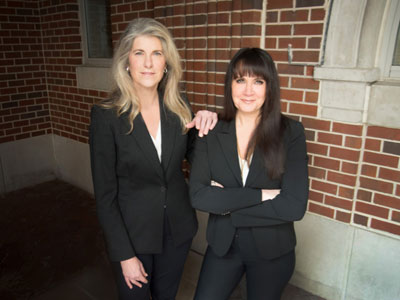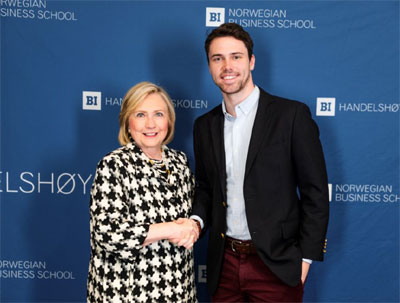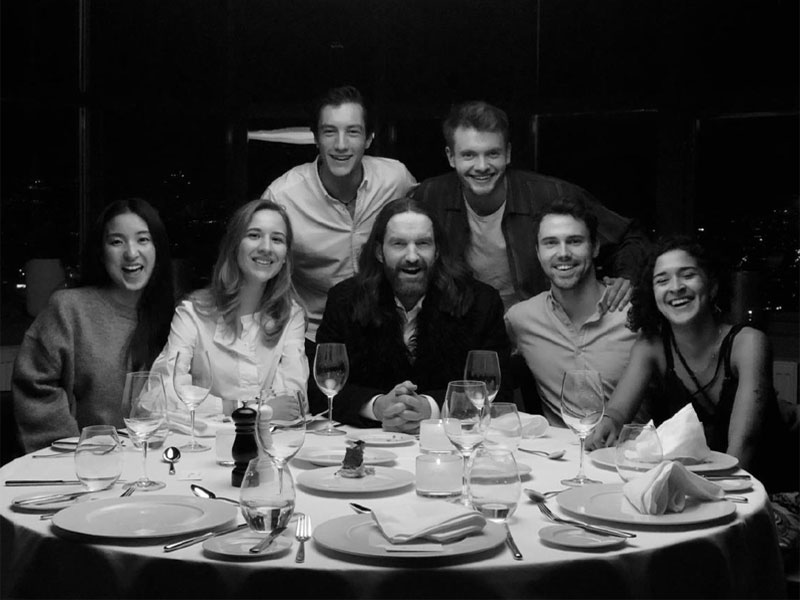A Message from Our Title IX Coordinator, Meredith Smith
When I started my graduate assistantship in the Northwestern student conduct office in 2010, I opened the cabinets above my new desk and did a double take: I was working in student conduct, not health services, okay, so why did I have several bottles of hand sanitizer and Kleenex in the cabinet…and were those face masks? Like surgeons wore? My boss explained to me these were the remnants of Northwestern’s prep for the H1N1 swine flu epidemic the year before; he told me about the huge plans the school had made in anticipation of the infection swallowing the campus community, including turning a gym on campus into a giant quarantine hospital. It had all become a joke in the safe harbor of fall 2010, the swine flu a threat that had not materialized as feared: Ha, ha, silly Northwestern freaked out over the flu.
This is where the public health majors reading this scream in unison, “Yeah, but the prevention and preparation work is what saved us!” I know. I get that now. But 2010 up to February 2020 me? Didn’t know. Not at all.
It is only now, in the deep heart of this crisis, that the scope and necessity of public health measures has really sank in for me. That seems odd, I’m sure, since I crow about prevention all the time when it comes to sexual violence, but what does it actually mean to implement these things that will make the change we need? To stop the coronavirus, we must implement changes in our lives that take some degree of effort, from minimal to what can only be termed a sacrifice. For me, I am struggling most with not touching my face. It’s so small and so simple and I cannot stop. Here I am in Fresh Market, waiting for my salmon, and my nose itches and why can’t I itch my own nose? I’m a grown adult, the itch is driving me bonkers, is it really truly actually going to hurt anyone if I scratch my face and then put my hand back on the cart (that I’ll disinfect, I swear I won’t forget to wipe it off except okay maybe I will forget), then I put my hand on only things that I’ll buy (except when I pick up that one box of crackers and then notice it’s the wrong flavor and put the box back on the shelf for someone else to touch), then I put my hand on the credit card machine, then…then…then…
Stop touching your face, Meredith. Yeah. You have to. Even if it’s annoying.
Start asking for consent. Every time. Yeah, even if it’s awkward. Even if it “kills the mood” (side question: What mood gets killed if merely asking the words “this okay?” punctures it like a needle in a balloon? Is this like the emperor’s groove or something?). And the flip side to that: Accept the fact that a person can tell you no. Yeah. You have to. Even if it’s frustrating.
The parallels between the public health crisis we are in now and the conversations we have been having about Tulane’s manifestation of the public health crisis around sexual violence are clear and present. We, too, have to step up the work we do as individuals, as a community, to make any headway against a disease that thrives and spreads in our normal lives. Our society has to actively work to disrupt the infection. And it’s freaking hard. But we do it. Like we have been doing it, with the coronavirus. When we all come back together, hopefully not too far in the future, and we ask you to engage in the public health measures that we need to confront this other pandemic, one that impacts 41% of the women on our campus and 18% of the men, measures that might be annoying and frustrating and awkward and hard, hopefully the muscle memory from now kicks back like a reflex. These are the things we do in a community where my health is linked to your health: You matter as much as I do, and I do these things to protect you as much as me. It may be difficult and uncomfortable, but I’m worth it. And so are you.
So I don’t scratch my nose even though that itch is almost painful in its persistence. I bought a face mask on Etsy, even though I feel super weird wearing it. And I stay inside my house – alone – away from my loved ones. Just me and my dog and my thoughts and seasons 1-5 of Murder She Wrote on Amazon Prime. Because prevention is what will save us. Because prevention is what we have to do, you and me. Now, and again.
Until we are back again, though, know that the university is still here, humming like the motor of an unseen machine: All of the support systems that you had before are running – CMVSS and CAPS, the Student Health Center, The Line. My office. Conduct and OIE and TUPD. All of us, moving along because Tulane is open and so are we. As long as Tulane is here, support is here.
And here’s another truth: We miss you, more than you know. We love you, more than you know. Stay safe, stay healthy, stay vigilant. Make the changes we need, the prevention and the preparation, for yourself – but for one’s own, too.
Student Spotlight: Claire Wynne: Celebrating Sexual Assault Awareness Month (from home)

Despite all of the craziness of COVID-19, Sexual Assault Awareness Month (SAAM) is upon us this April. Many of us did not expect to spend this month at home in the midst of a global pandemic. However, we should continue to acknowledge and celebrate SAAM, taking this opportunity to educate our communities and spread awareness. But how can we continue these efforts with limited physical contact?
Activism comes in all shapes and sizes. There are so many ways that we can take part in SAAM remotely from reading a book to engaging family members and loved ones in productive conversations about sexual violence. Taking the time to educate ourselves and those around us while supporting survivors and practicing self-care are integral components of recognizing and celebrating SAAM.
While practicing social distancing, social media is a powerful way to see and spread information. Even sharing a story about consent or rape culture allows people to contemplate these topics and their relation to sexual assault. Sharing statistical facts and related messaging can also be helpful for people to grasp the breadth of the issue. These efforts can be an influential tool for spreading awareness because Instagram activism is such a popular trend at the moment.
Below, I listed some organizations that will likely be sharing educational information and graphics on their Instagram accounts that you can go follow. For some Tulane specific messaging, follow @tulanetitleix, @tucampushealth, and @tusaphe! Even taking 30 seconds out of your day to watch a video or read a post can expand your understanding!
- @nsvrc (The National Sexual Violence Resource Center)
- @rainn (The Rape, Incest, and Abuse National Network)
- @ndvhofficial (The National Domestic Violence Hotline)
- @familyjusticecenter
- @theequalityinstitute
- @nomoreorg
- @loveisrespectofficial
- @endrapeoncampus
- @paveinfo
- @staradvocates
- @letsgetconsensual
As for books to read this month, I recommend Sexual Citizens by Jennifer S Hirsch and Shamus Khan, Not That Bad by Roxanne Gay, and On Being Raped by Raymond M. Douglas.
Lastly, this month can be a difficult and confusing time for survivors to navigate between coping with their own experiences, practicing self-care, and spreading awareness and activism about sexual violence. If this applies to you, please remember that being a survivor does not mean that you must become an activist. Survivors should not be expected to bear the weight of preventing sexual violence.
Practicing self-care during this time is so important for our mental and physical health, especially if we are coping with trauma. Self-care is all about taking steps to feel healthy and comfortable. Whether you experienced trauma recently or years ago, self-care can help you cope with the short- and long-term effects of a trauma like sexual assault.
The key to emotional self-care is being in tune with yourself. Think about a time when you felt balanced and grounded, and consider asking yourself the following questions: What fun or leisure activities do you enjoy? Are meditation or relaxation activities a part of your regular schedule? What inspirational words are you reading? Do you have a particular author or favorite website to go to for inspiration? Who do you spend time with? Is there someone, or a group of people, that you felt safe and supported around? While maintaining social distancing, is it possible for you to call (or Zoom) the people that make you feel grounded and supported? Is there a special place, maybe outdoors or at a friend’s house, where you felt comfortable and grounded (while maintaining a socially safe distance)?
Whether you’re curling up on your couch with a book, sharing a post about consent, or just keeping survivors in your thoughts, I wish you all a safe and restful Sexual Assault Awareness Month.
Claire Wynne (she, her, hers) is a Junior studying Political Economy from the San Francisco Bay Area. Claire serves on the Executive Board of Sexual Aggression Peer Hotline and Education (SAPHE) and sits on the Student Coalition for Sexual Violence Prevention and Response.
Faculty Spotlight: Becki Kondkar, Katherine Mattes, and the Women’s Prison Project
Reprinted with permission from the author Alina Hernandez

Tulane Law School has received a nearly $2 million gift to expand an innovative clinical program providing legal services and advocacy for imprisoned women who were victims of domestic violence, Dean David Meyer announced.
The anonymous gift will support the Women’s Prison Project (WPP), a first-of-its-kind collaboration between Tulane’s Domestic Violence and Criminal Justice clinics focused on cases involving a domestic violence survivor charged with killing an abuser or for having committed crimes under an abuser’s coercion or duress.
Totaling $1.9 million over four years, the gift will enable Tulane to hire two clinical professors and three professional staff members to dramatically expand the WPP’s impact.
“The WPP reflects the best of what makes Tulane’s clinical program so special,” said Dean Meyer. “It arose from the insights and ambition of our faculty and prepares students for successful careers while addressing urgent needs in society.”
“We could not be more grateful to the generous donors for their vision and partnership in making this possible,” Meyer said.
Tulane President Mike Fitts echoed Meyer’s gratitude for the gift and the important work it will fund.
“This gift supports the kind of bold, impactful and transformative efforts that are at the heart of Tulane’s educational mission,” Fitts said. “We prepare our students to do good, to promote justice and to improve the human condition, not only as future leaders, but here and now, through a hands-on, life-changing curriculum.”
Founded by Professor Becki Kondkar, director of Tulane’s Domestic Violence Clinic, and Professor Katherine Mattes, director of Tulane’s Criminal Justice Clinic, the WPP tapped into a long-ignored crisis: women’s contact with the criminal justice system often arises from their victimization by violent partners.
“We are so fortunate to have a donor who supports the bold action and expansive vision necessary to address this problem,” Kondkar said.
The gift will enable a fully-staffed WPP and student-attorneys to represent domestic violence survivors who killed abusive partners through clemency and parole hearings before the Pardon and Parole Board and to work on post-conviction cases where the client’s history of abuse were inadequately addressed at trial.
The overarching goal, said Kondkar, is to end the practice of punishing and incarcerating domestic violence, sexual assault, and trafficking survivors in Louisiana, through law and policy reform, training, and education.
"There are so many women in Louisiana sentenced to die in prison for defending themselves. We have a lot to do, but we have a lot of hope,” said Mattes. “Hope because the time is ripe for reform; hope because there is a growing awareness about intimate partner violence; and hope we get from these women who, despite everything, haven’t given up."
Kondkar, who has spent more than 20 years representing survivors of abuse, began conceptualizing the project several years ago when working on a case involving a trafficking victim sentenced to life in prison.
“During a time when #Metoo has captured the public’s consciousness on issues related to gender, these incarcerated women have remained invisible. It was time to do something bold to raise them into our public consciousness,” Kondkar said.
Kondkar and Mattes joined forces and began examining the cases of women imprisoned for killing domestic partners in self-defense. They engaged student-attorneys to help and advocate before law enforcement, court officials and the Louisiana Board of Parole.
According to Kondkar and Mattes, women are uniquely vulnerable to wrongful convictions when they defend their lives against abusive men. The problem results, in part, from self-defense laws that are not tailored to modern understandings of domestic violence.
“Women’s experiences of abuse become both buried and distorted by a justice system that first fails to take their experiences of abuse seriously, and then punishes them for protecting themselves,” said Kondkar.
In Louisiana, the problem is among the worst in the nation. Louisiana consistently ranks among the top four states in the nation of women killed by men. A recent Amnesty International Report on domestic violence in Louisiana documented, extensively, the barriers Louisiana women face when seeking protection in the justice system. Domestic violence services are woefully underfunded, and courts fail to protect women before a homicide occurs.
Yet when women in Louisiana are convicted for killing abusive partners, they are often sentenced to life in prison under draconian mandatory sentencing guidelines for second-degree murder.
This Project aims to both remedy the injustices of the past, and promote changes to the law that will prevent these injustices from continuing.
Through both direct client advocacy and the creation of a regional “think-tank” on these issues, the WPP will help pave the way for reforms that are sorely needed in Louisiana and around the country, said Kondkar, who was recently appointed to the American Bar Association’s Commission on Domestic and Sexual Violence.
The WPP’s cases have already made an immeasurable impact on a number of families, and, along with them, Tulane Law students.
Through the WPP, students in both clinics gain hands-on legal training, and work directly with clients. Courtney Crowell, a 2019 graduate now practicing law in New Orleans, was among the first students to work with the WPP as a third-year law student.
Crowell represented a woman who has spent almost a quarter of a century in prison for killing her estranged, abusive boyfriend when he kicked her door open, entered her home, and strangled her.
Crowell’s work with the client, documenting the cycle of domestic violence and its impact on one family, was the perfect snapshot of the state’s inadequate protection of a victim to bring before the state’s Pardon and Parole Board.
Crowell’s client has led a model life in prison, mentoring other women, creating programs to help other inmates, and making sure her sister and daughter graduated from college.
“It was completely life changing for me, personally and professionally,” said Crowell. “I realized the power behind a law degree. Having that license should be a reason to give back to others, to make life better for someone else, not just for self-gain.”
“It completely changed my priorities and showed me the kind of lawyer I want to be, and how I want to build my legal career.”
Crowell’s client, along with two other WPP clients, now have commutation requests awaiting approval by the governor’s office. In the three cases, domestic violence victims were in their own homes when they killed abusers who attacked them. Many of the Project’s cases involve women in their sixties or seventies who have spent decades in prison and are in failing health.
“If the average citizen were to know and understand the extent to which women are languishing in Louisiana’s prisons for defending their own lives - in their own homes- they would be shocked. The fact that these women will die in our prisons if we do nothing, is something every citizen should know about and care about,” Kondkar said.
Tulane Student Attends Gender Equality Experience

Last spring, William Potts, then a Tulane senior, was one of six students chosen from over 750 international applicants to be a part of the Gender Equality Experience in Norway. The Gender Equality Experience is a program through the Norwegian Business School to learn about the economic benefits of gender equality. Through the program, Potts spent what he described as a “pretty crazy week” meeting with politicians and faculty experts as well as exploring Norway.
Potts stumbled onto this opportunity by chance. While leaving class one morning, he ran into a friend dressed in a business attire who said she was about to interview for a “cool trip to Norway” being promoted by the Freeman School of Business. Potts’s interest was piqued, and he quickly put together a video application. A business and communications major, Potts had cultivated an interest in gender issues through several elective classes at Tulane and through participating in the International Day of Women Summit with Canadian Prime Minister Justin Trudeau.
Potts was astounded when he was one of six international participants chosen for the Gender Equality Experience. He spent his March 2019 spring break in Norway. A film crew followed the students throughout the week as they met with local politicians, including the mayor of Oslo, attended lectures and group discussion with faculty experts at the Norwegian Business School, and took in the area sights and culture, including a dip in a floating sauna across from the famous Oslo Opera House. The capstone of the week was a conference featuring politicians and experts from across the world, including a keynote from Hilary Clinton. Potts and the other participants also had a chance to meet Clinton.


Through the experience, Potts learned about various policies and programs Norway has implemented to foster gender equality, including extensive paid parental leave for both parents and flexible work schedules that allow working parents to balance their career and family needs. Potts did note that there are some fundamental differences between the United States and Norway that make these policies easier to implement in Norway; however, he believes that employers in the United States could start voluntarily implementing these policies, which would create better relationships between companies and employees. Potts stated that gender equality often isn’t framed as an economic issue but his experience in Norway showed him that gender equity makes economic sense. Potts argued that employers lose out on talent when women aren’t offered the same opportunities as men.
Since graduating from Tulane, Potts has been employed as an analyst with a commercial real estate investment and development company in Washington, DC. Potts stated that his experience has made him more aware of how the commercial real estate industry is very male-dominated. He is interested in opportunities to “level the playing field” and get more women in the industry. He spoke with excitement about a colleague starting up a group to support women in real estate. Potts shared that visiting another country and interacting with participants from across the world helped him gain perspective on how far the United States has come in terms of gender equity “but also how much farther we have to go.” Potts plans to continue advocating for gender equity in the workplace and also encourages Tulane students to take advantage of the opportunities available to them, like the Gender Equality Experience.
What We’re Reading and Watching: Sexual Citizens and To All the Boys
To talk about the book Sexual Citizens: A Landmark Study of Sex, Power, and Assault on Campus by Jennifer S. Hirsch and Shamus Khan, let me (me being Meredith—hi, you might remember me from such things as the intro) quick tell you a story. I went from Northwestern to Dartmouth in June 2011 to work in their Office of Undergraduate Judicial Affairs as an assistant director, and somewhere in that summer, a bunch of us from Dartmouth drove from New Hampshire to Cambridge, Massachusetts, to attend a training in sexual assault investigation at Harvard. In particular, David Lisak, a psychologist, trained us in how serial perpetrators were the main drivers of campus rape, so if we could just identify the serial rapists and their tricks, we would solve college rape. Boom.
Determined, I arrived back at Dartmouth totally psyched to apply my cutting-edge knowledge about perpetration and end sexual assault, damn it. (Note: I was 31, far too old to be that naïve, but I also got way into The Vampire Diaries that year, so it’s not like I’m some genius here, okay?) In fact, I got my first ever sexual assault case right after that training…yet the kid accused in that case didn’t fit what Lisak had said about serial perpetrators. In fact, neither he nor the reported victim had anything to drink that night.
Actually, none of the other eleven sexual assault cases I took to formal hearings on over the next two years fit the serial perpetrator mode that Lisak said was typical of college sexual assault. If I expanded my view to include the many cases where the victim declined to go forward with formal conduct action, none of those really fit the serial perpetrator model, either. Over those two years, I did cross paths with two students who I did think were the selfish, sociopathic types that Lisak described, but I met them in non-sexual assault cases (an academic honor case and a hazing case, if you’re curious). When I left Dartmouth in 2013, I was deeply confused: I have a renowned researcher telling me what causes sexual assault on campuses, but my experiences didn’t match it at all.
If I had been able to read Sexual Citizens, though, in the summer of 2011, it would have matched the stories and understanding of campus sexual assault. For me—and for a lot of my colleagues reading the book now—this book validates a lot of what we’ve seen on the ground for years. As NPR described in the summary, this book was written by “the co-directors of Columbia University's groundbreaking SHIFT study into campus sexual assault,” and Hirsch and Khan “reveal the complex social ecosystem of physical space, alcohol, peer dynamics and cultural norms that influence the experience and interpretations of both sex and sexual assault.” The book explores the stories of students they interviewed and Columbia’s social culture, and how all of these factors of individual and community create a culture where sexual assault can thrive. It is maybe the most true portrait of campus sexual assault, and therefore, it’s heartbreaking and demoralizing and rage-inducing…but in that accuracy, it also gives us a roadmap of how we can confront it. The book’s not perfect (I have a few notes of things I wish it had included and some limitations it doesn’t fully acknowledge), but we don’t ask truth to be perfect—just enough that we feel seen and can see something in its whole, or as much as we can see. Please read this book; it’s what I wish I had gotten in 2011, and I’m so glad that we got it now.
On a lighter note, here’s one more quick plug: PS I Love You, the sequel to To All the Boys I’ve Loved Before. Watch it. Not as good as the original, but for sure a solid watch.
…kidding, there’s a reason we’re promoting it. It’s very small and very brief, but in the movie, Lara Jean and Peter Kavinsky talk about sex, and it’s not only a great glimpse of how people actually talk about sex in relationships, but a great model of how to be respectful of your partner. It doesn’t have to be awkward and dumb; it’s how you show you care. Consent isn’t a huge formal deal, it’s these small moments of dialogue and checking in, talking about expectations, too. (Though full disclosure, I think I’m Team John Ambrose? I mean, I mad respect Peter’s consent game as well as his great hair, but…John Ambrose forever, y’all.)
Connect With Us on Social Media
While we are all missing our on-campus connections right now, we are making sure that we stay in touch digitally! We are in the midst of Sexual Assault Awareness Month (SAAM), a time when individuals and institutions come together to raise public awareness about sexual violence in all its forms and educate our communities about how to prevent it. We invite you to follow Campus Health and the Title IX office on social media to stay engaged with our offices and SAAM! You can follow Campus Health on Facebook and Instagram. Title IX is also active on Facebook and Instagram and is posting daily videos Monday-Friday to educate our community about topics ranging from research on sexual violence, legislation, key campus partners, and the Title IX office’s new work-from-home co-workers (aka, their beloved pets). You can view the introductory video below and find the rest of the series on Title IX’s Facebook and Instagram pages.
Finally, we encourage everyone to participate in Denim Day on April 29.
What is Denim Day? (*TW: brief description of assault)
The Denim Day story begins in Italy in 1992, when an 18-year old girl was raped by the 45-year old driving instructor who was taking her to her very first driving lesson. He took her to an isolated road, pulled her out of the car, removed her jeans and forcefully raped her. She reported the rape and the perpetrator was arrested and prosecuted. He was then convicted of rape and sentenced to jail. Years later, he appealed the conviction claiming that they had consensual sex. The Italian Supreme Court overturned the conviction and the perpetrator was released. A statement from the Court argued that because the victim was wearing very tight jeans, she had to help him remove them, and by removing the jeans it was not rape but consensual sex. This became known throughout Italy as the “jeans alibi.” Enraged by the verdict, the women in the Italian Parliament launched a protest wearing jeans on the steps of the Supreme Court. This protest was picked up by international media which inspired the California Senate and Assembly to do the same on the steps of the Capitol in Sacramento. Denim Day was born. The first Denim Day event was held in April of 1999, and has continued annually since. To learn more, click here.
When is Denim Day?
All day on Wednesday, April 29, 2020
How do I participate?
Throw on your favorite denim and take a selfie along with a sign or caption that reads, "Ask me why I'm wearing denim today." Post the image to your personal or office's social media along with a message of support for survivors. Messages like, "I wear denim because I support survivors," or "Rape culture is real but rape myths are not," help to empower and encourage survivors within our Tulane community. Again, feel welcome to get your family or pets involved! Hashtag your post with #denimday and make sure to tag @tucampushealth and @tulanetitleix so that we can repost! And be sure to follow Campus Health and Title IX on social media so that you can see all the posts!
